Book by Gianluigi Negro

Luiss University Press, 2022
Lo studio dei mezzi di comunicazione in Cina costituisce un tema di sempre maggior interesse e di... more Lo studio dei mezzi di comunicazione in Cina costituisce un tema di sempre maggior interesse e dibattito. L’uso di nuove e potenti tecnologie nei media ha infatti contribuito a rivoluzionare il mondo della comunicazione e dell’informazione cinesi e lo ha fatto a tal punto che la questione non è più relegabile al solo piano nazionale, ma si è fatta globale. Nel corso degli ultimi 70 anni, la Repubblica popolare cinese ha sperimentato nuove tecnologie e forme di comunicazione che hanno avviato un processo di rafforzamento dell’identità nazionale in continua evoluzione. In questo processo, fattori legati al controllo della popolazione, alle necessità di mercato e alle spinte identitarie hanno plasmato un nuovo uso dei media. Gianluigi Negro, utilizzando gli strumenti del sinologo e quelli dell’esperto di media studies, offre una ricostruzione inedita e articolata sulla storia dei media cinesi e su come giornali e radio, televisione e cinema, social media e app, dalla fondazione della Repubblica popolare cinese a oggi, abbiano contribuito alla costruzione dell’identità nazionale. Le voci di Pechino è, inoltre, un’analisi critica sui possibili usi ideologici e propagandistici dei nuovi media, una riflessione sul rischio della loro trasformazione in strumenti di omologazione e controllo dell’opinione pubblica.

This book focuses on the history of the International Telecommunication Union (ITU), from its ori... more This book focuses on the history of the International Telecommunication Union (ITU), from its origins in the mid-19th century to nowadays. ITU was the fi rst international organization ever and still plays a crucial role in managing global telecommunications today. Putting together some of the most relevant scholars in the fi eld of transnational communications, the book covers the history of ITU from 1865 to digital times in a truly global perspective, taking into account several technologies like the telegraph, the telephone, cables, wireless, radio, television, satellites, mobile phone, the internet and others. The main goal is to identify the long-term strategies of regulation and the techno-diplomatic manoeuvres taken inside ITU, from convincing the majority of the nations to establish the offi cial seat of the Telegraph Union bureau in Switzerland in the 1860s, to contrasting the multi-stakeholder model of Internet governance (supported by US and ICANN). History of the International Telecommunication Union is a trans-disciplinary text and can be interesting for scholars and students in the fi elds of telecommunications, media, international organizations, transnational communication, diplomacy, political economy of communication, STS, and others. It has the ambition to become a reference point in the history of ITU and, at the same time, just the fi rst comprehensive step towards a longer, inter-technological, political and cultural history of transnational communications to be written in the future.
This book aims to identify the most important political, socio-economic, and technical determinan... more This book aims to identify the most important political, socio-economic, and technical determinants of Internet development in China, through a historical approach that combines political economy, cultural, and public studies. Firstly, the book looks at the most important strategies that compelled the Chinese government to invest in the construction of the Internet infrastructure. Secondly, it examines the relationships between the development of the Internet in China and the emergence of a nascent civil society. Finally, attention is given to three different Chinese online platforms in three different historical periods. This three-pronged approach presents a coherent set of analyses and case studies which are committed to the investigation of the complex process of change undergone by Internet development in China.
Papers by Gianluigi Negro
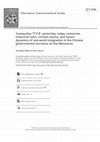
As one of the most searched buzzwords on the Chinese Internet in 2021, the ‘Metaverse' (yuan yuzh... more As one of the most searched buzzwords on the Chinese Internet in 2021, the ‘Metaverse' (yuan yuzhou 元宇宙) has gained significant momentum in the People’s Republic of China (PRC), attracting the attention of entrepreneurs, politicians, and scholars. To contribute to the understanding of this phenomenon, the present paper provides a historical overview of the Metaverse, highlighting, through a de-Westernized lens, the peculiarities of its development within the specific historical and political context of the PRC. For this purpose, it combines a historical approach with qualitative thematic analysis, examining the Chinese official discourse on the Metaverse, mainly through the scrutiny of governmental papers. Specifically, this study tries to answer the question of how the Chinese official narrative on the Metaverse is being constructed and how it is evolving. In doing so, the essay starts by reconstructing the pre-history of the Chinese Metaverse; then, it focuses on the analysis of plans and action schemes implemented both at the central and national levels, especially in the municipality of Shanghai. The analysis demonstrates how the development of the Chinese Metaverse is in line with previous development goals of the government digital agenda and how its implementation is at the crossroads of technological-cultural progress, regulatory control, and ideological challenges.
Communication and the Public , 2024
This essay examines the history of Chinese digital media, specifically the internet, through soci... more This essay examines the history of Chinese digital media, specifically the internet, through social imaginaries and metaphors. The text identifies three different set of metaphors that reflects the roles of the government, business sector, and civil society in the last 30 years of the Chinese internet.

Global Media and China, 2024
This article aims to provide a historical dimension of the Italian public opinion on Huawei, and ... more This article aims to provide a historical dimension of the Italian public opinion on Huawei, and vice versa of the Chinese perception of Huawei's role in Italy. Through a qualitative content analysis, the author examines Italian newspapers framing on Huawei as well as Chinese newspapers framing on the Italian telecommunication market before and after and after the signature of China-Italy memorandum of understanding in 2019. The research provides a periodization of three stages that highlights the evolution of the Chinese company in Italy and examines to what extent its activities can fit within the paradigm of imperialist actions. Based on a historical perspective, this contribution examines the perception of China's digital infrastructure outside the Chinese borders, while also focusing on policy imaginaries through the corporate nationality theory and analyzing the rhetoric of "nationality" applied to a specific organizational behavior in the aggregation of different communities.
Global Governance, 2023
This article maps the evolution of the Chinese activities within the International Telecommunicat... more This article maps the evolution of the Chinese activities within the International Telecommunication Union (ITU), with a focus on the Chinese standard-setting experience. It analyzes three diFferent moments of the ITU-China standard-setting history:
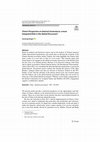
Journal of Chinese Political Science , 2023
Based on political and historical sources and on the analysis of Chinese presence within internat... more Based on political and historical sources and on the analysis of Chinese presence within international organizations, this article aims at showing the evolution of the Chinese Internet governance model. Namely, this study highlights the Chinese shift from a status of a norm taker to that of a norm maker. This research argues that China began to be engaged in the global governance discussion of the Internet from the first years of its Internet history. Because of its historical relations with China and its impact on domestic Chinese Internet history, the International Telecommunication Union (ITU) was considered the ideal international organization to govern the global Internet. The present article confirms this through the analysis of Mr. Zhao Houlin's strategies before and after his election as Secretary General of the ITU. Finally, in line with the rationale of the present special issue, this research argues that the Chinese role in the global Internet governance debate does not reverse its status quo of the global Internet governance. Whereas, given China's engagement in the Internet Corporation for Assigned Names and Numbers (ICANN), engagement suggests a collaborative attitude.
Online Journal of Communication and Media Technologies, 2020

Long before the birth of the Internet, before the construction of roads, railways and highways, b... more Long before the birth of the Internet, before the construction of roads, railways and highways, before the discovery of blood and neural systems, rivers were the main channels of communication and the world's "natural" networking infrastructure. In all continents, rivers were worshipped as gods with specific spirits. They provided water and fertility, like the Nile in ancient Egypt, the Amazon in Latin America, and the Yellow River in China. Rivers are also myths and symbols: they have played a role in the founding mythologies of cities like Rome (the two founders Romolo and Remo were saved by the god of the river Tiberinus) or were symbols of freedom in formative novels like Mark Twain's The Adventures of Huckleberry Finn. And, of course, rivers have always acted simultaneously as routes and borders between human communities. As other water gods, rivers are temperamental-sometimes calm, good divinities, sometimes furious and evil destroyers. Just like in our inter-networked world, river societies lived an instable, unpredictable life. In line with Hu Yong's (2008) suggestion that the Internet and computer networks should be thought of through metaphors and analogies and in line with John Durham Peters' (2015) idea of including natural elements in media studies, we hereby propose that computer and river networks share many common features. Firstly, they are both communication and transportation infrastructures. In their respective realms, rivers and computer networks have been elective channels for the transmission of knowledge, for cultural and economic exchange or, in Harold Innis' terms (1950), means of communication. Furthermore, they are communication networks with hubs, points of exchange and switching and primary and secondary branches. Metaphorically, we browse, surf, and navigate the Web, along those streams that "the network of networks" opened up to human communication only a few decades ago. Secondly, like many other essential infrastructures such as electricity and gas, rivers and computer networks are mostly invisible, both materially and symbolically. Only a minimal part of their material form emerges zurück zurück zurück
Sulla Via del Catai , 2020
The present contribution provides a diachronic perspective on the last 15 years of online platfor... more The present contribution provides a diachronic perspective on the last 15 years of online platforms in China analysing the success and the evolution of four platforms that are: Youku, Tudou, iQiyi and Kuaishou. The experience of the Chinese platforms shows how cultural dynamics, economic and linguistic policies contributed to create a peculiar online environment in China and how they should be considered within the theoretical framework of “platform studies”.
Sulla via del Catai Rivista semestrale sulle relazioni culturali tra Europa e Cina Il corpo della Cina: sport, politica e identità, 2019
The realization of China’s football dream falls within the theoretical framework of
soft power en... more The realization of China’s football dream falls within the theoretical framework of
soft power enhancement and relies in practice on the effectiveness of the cultural industry’s development strategy. This paper adopts this perspective in order to introduce one of the most recent attempts put forward by the Chinese authorities to accelerate
the reform and development of football and improve the performance of the Chinese national team: the naturalization of foreign players and their successive call-up to Team China.
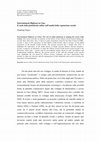
H-Ermes , 2020
Entertainment Highway in China. The role of online platforms in shaping the social credit system.... more Entertainment Highway in China. The role of online platforms in shaping the social credit system. This article provides an analysis on the history of the Chinese Social System taking into account three directions: first, it refers to policy documents issued by the State Council of PRC; second, it refers to the experience of Sina Weibo Credit System; third, it focuses on the failed experience of the Sesame Credit System. The present research has a double aim. First, it highlights the importance of the media history to frame relevant Chinese Internet dynamics; second, it suggests an alternative to study the Chinese Social Credit System going beyond to the dichotomy vision state-citizens and its preconditions mainly based on state surveillance and Confucianism traditions. Whereas, the present article, in line with the rationale of the special issue, highlights the role played by Chinese private companies and more importantly, their attitude to shape the structure and the management of their platforms and services boosting the importance of entertainment. Fin dai primi anni del suo sviluppo, lo studio di Internet in Cina, stando ad una lettura "occidentale", è sempre stato prevalentemente caratterizzato da una forte connotazione politica. Nella sua prima fase, tra la fine degli anni Novanta e i primi anni Duemila, parte della narrativa scientifica sosteneva una visione sostanzialmente basata sul determinismo tecnologico e focalizzata sulle possibili forme di pluralità comunicative legate allo sviluppo di infrastrutture e servizi Internet in Cina (Zheng 2007). Alcuni studi si sbilanciarono fino a predire che Internet avrebbe favorito lo sviluppo della democrazia (Cooper 2000; Peters 2002). Il ricorso a studi quantitativi su tecniche e politiche di controllo online in Cina hanno tuttavia presto ridimensionato l'ottimismo iniziale. I contributi di Abbott (2001) e Taubam (1998), tra gli altri, misero in luce fin dai primi anni come sia il digital divide interno alla Cina, che la probabile ondata di commercializzazione, avrebbero fortemente ostacolato un sostanziale sviluppo di apertura accanto a forme di pluralità sociale e politica. Analisi di questo tipo trovarono seguito negli anni successivi anche grazie ad analisi sempre più puntuali sulla creazione, sullo sviluppo e sull'implementazione del così detto
Global Media and Communication , 2020
This article contributes to the literature on WeChat, providing a historical perspective on the l... more This article contributes to the literature on WeChat, providing a historical perspective on the long-lasting culture of its mother company, Tencent. Through a corpus of primary and secondary sources, the article retraces four constitutive choices which characterized Tencent's culture from 1998, when the company was founded, to 2011, when the first version of WeChat was launched. We argue that Tencent's market strategy has always been based on four principles: mobility, media convergence, gaming/youth culture and Sinicization. The article concludes by highlighting that these constitutive choices paved the way to the creation of WeChat, thus contributing to its current success.
Problemi dell'Informazione , 2020
This article aims to analyze how the One Belt and One Road Initiative (OBOR) is framed by the Eur... more This article aims to analyze how the One Belt and One Road Initiative (OBOR) is framed by the European Italian speaking press. It provides a deductive content analysis on the historical visit of President Xi Jinping in Italy, the first G7 country to sign a memorandum of understating on One Belt and One Road Initiative, on March 2019. The article analyses the reports published on the most popular Italian newspapers on Xi’s visit to Italy. Providing four categories to interpret the news frames, it empirically demonstrates how China is negatively presented and perceived in the Italian press.
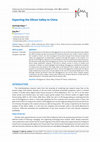
Online Journal of Communication and Media Technologies, 2020
This article focuses on the history of Zhongguancun as one of the most important area used by the... more This article focuses on the history of Zhongguancun as one of the most important area used by the official Chinese narrative to promote the historical shift from the “made in China” model to the “created in China” one. We reconfigure this process through three historical phases that reflect the engagement of policymakers, business and high-tech agents in the creation of a specific social imaginary. Based on a textual analysis as well as on political and sectorial sources, this historical study argues that Zhongguancun carries a set of cultural values influenced by the Silicon Valley experience, however it still fails to achieve success in terms of creation and innovation. In detail, our article highlights three findings: Zhongguacun satisfied the conditions of creative area only during its first stage, when local industries had to adapt its services and products to the Chinese language and culture. Second, Zhongguancun shared with the Silicon Valley neoliberalists issues such as those related to the risk of a real estate bubble burst. Third, although Chinese documents show that Zhongguancun has not the same creativity outputs compared to the Silcon Valley, it shares with California its financial dynamics mainly driven by huge investments in innovation places like innovation cafes.
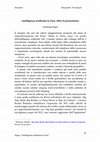
Sinosfere, 2019
Pur riconoscendo, da una parte, i recenti sviluppi dell’industria AI in Cina, sia a livello nazio... more Pur riconoscendo, da una parte, i recenti sviluppi dell’industria AI in Cina, sia a livello nazionale che internazionale, e, dall’altra, il complesso impianto teorico-interpretativo che lo sottende, il presente articolo non vi si addentra e mette in secondo piano la questione del controllo sociale o, più in generale, degli intenti e delle visioni della leadership cinese con il relativo corollario di altri temi scottanti come la privacy, la sicurezza online, la censura, etc. La finalità di questo saggio propone invece una lettura diversa e, si auspica, altrettanto utile, una visione storica di lungo periodo in merito allo sviluppo dell’intelligenza artificiale in Cina con l’obiettivo di individuare i primi passaggi chiave e cercare di arginare un’interpretazione determinista già conosciuta in Cina tra la fine degli anni ’90 e i primi anni 2000 con l’avvento dei nuovi media e lo sviluppo di Internet. L’analisi dell’esperienza storica relativa allo sviluppo dell’AI in Cina può offrire una chiave di lettura utile non solo per contestualizzare le attuali divergenze politiche ed economiche tra Cina e Stati Uniti ma è altresì utile per provare a delineare forme di continuità e rottura nel corso degli ultimi 40 anni di storia e di politiche per lo sviluppo tecnologico, e nello stesso tempo per mettere in luce una serie di limiti e problematiche denunciate dagli stessi ricercatori cinesi nel recente sviluppo tecnologico in Cina.
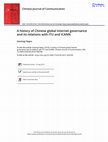
Chinese Journal of Communication , 2019
The Chinese contribution to global Internet governance debate has been studied mainly by focusing... more The Chinese contribution to global Internet governance debate has been studied mainly by focusing on the governmental perspective. This study was aimed to provide a broader view by analyzing the participation of Chinese academics and civil society in two of the most important Internet governance international organizations: the Internet Corporation for Assigned Names and Numbers (ICANN) and the International Telecommunication Union (ITU). Based on historical material and in-depth interviews conducted in Geneva and Beijing, the findings show the evolution of Chinese Internet governance at the global level and suggest the following: first, the Chinese agents in the global debate on Internet governance support a multi-stakeholder perspective; second, although seldom engaged in the decision-making process, the Chinese agents involved in the global governance identify ITU as the more credible international organization in coordinating global governance; third, the Chinese agents have an ambivalent approach to Chinese participation both in ITU and ICANN. Finally, the findings of the study reported in this article contest the understanding that Chinese Internet governance is isolationist in nature.
Chronos Verlag, Histoire et Informatique , 2019
The paper analyzes three of the strategies of the Chinese government for monitoring online speech... more The paper analyzes three of the strategies of the Chinese government for monitoring online speech.The first analysis examines the implementation of the real name registration system (shimingzhi) aimed at limiting online rumors. The ssecond analysis looks at the strategy that aims to guarantee more accurate control over online content, whilst also limiting the circulation of parodies. The third to be scrutinized is the Chinese government's strategy of hiring people (wumaodang) to comment positively on its actions,, increasing the online cacophony. The goal of this paper is to show the complexity of the Chinese political economy in terms of digital circulation.
Italian Association for Chinese Studies. Selected Papers 2,, 2018
The article aims to provide a historical overview on the Chinese vision of Internet information s... more The article aims to provide a historical overview on the Chinese vision of Internet information society starting from the 90s in order to identify the constitutive choices of the Chinese Internet governance. A particular attention is addressed to the role of private sector and its co-evolutionary approach in relation to the state government as well as the shift from an approach primarily focused on domestic issues (对内 duinei) to a more international oriented one (对外 duiwai).











Uploads
Book by Gianluigi Negro
Papers by Gianluigi Negro
soft power enhancement and relies in practice on the effectiveness of the cultural industry’s development strategy. This paper adopts this perspective in order to introduce one of the most recent attempts put forward by the Chinese authorities to accelerate
the reform and development of football and improve the performance of the Chinese national team: the naturalization of foreign players and their successive call-up to Team China.
soft power enhancement and relies in practice on the effectiveness of the cultural industry’s development strategy. This paper adopts this perspective in order to introduce one of the most recent attempts put forward by the Chinese authorities to accelerate
the reform and development of football and improve the performance of the Chinese national team: the naturalization of foreign players and their successive call-up to Team China.
by a brief sketch of the relevance of BRICS countries research in communication and media studies and some
prospective comments on this novel field. The contributing scholars in this issue focus on China and Brazil in particular and work across the globe in Germany, the Netherlands, Austria, Switzerland, PR China, the UK and Brazil.
They shared their ideas on the subject even though their scholarly roots lie in fields as diverse as regional studies,
political studies, communication and media studies and educational studies. Their thoughts were collected through
email interviews and they are presented here in form of a cross-disciplinary dialogue on the issue of visual online
communication in BRICS countries and the De-Westernization discourse. Gratefulness goes out to all the ones who have contributed and hopefully this project will have a say in many future dialogues between scholars from across the world
The ITU is the oldest UN agency, responsible for some of the most important issues related to information and communication technologies. It was created in 1865 to coordinate the telegraphic networks between countries, nowadays it operates in the fields of broadband Internet, wireless technology, and next generation networks. It also supports the development and coordination of worldwide technical standards.
ICANN is a non-profit organization that manages the coordination, maintenance, and procedures of several database related to the namespace and numerical space of the Internet. Through its contracts with registries (such as dot-com or dot-info) and registrars (companies that sell domain names to individuals and organizations), ICANN helps to define how the domain name system functions and expands.
This chapter also focuses on the role of the World Internet Conference (also known as the Wuzhen Summit), an initiative launched by the Chinese government to promote an alternative vision of the global Internet governance.
This analysis is mainly based on three sets of primary sources, in addition to secondary literature: Chinese policy reports, historical newspapers, and science fiction novels. The chapter is structured in four sections. The first section provides an overview of the most important scientists and policymakers who contributed to creating the first Chinese computers. As we will see, computers, and technology in general, were considered important vehicles for Chinese emancipation after the foundation of the Republic of China (1912) and more particularly after the foundation of the People’s Republic of China (1949). During the 1950s China benefited a lot from Soviet support.
The second section covers the period of the Great Leap Forward (1958-1962) and the Cultural Revolution (1966-1976), when China experimented with the domestic production of computers, after building up its own institutes of research and higher education, relying on the academic training of Chinese researchers in the United States, Europe and the Soviet Union. The CCP inherited a scientific elite educated in the West, that was sympathetic to leftist ideas that were also popular in some circles in the West, such as the planning of science.
During the third stage, covering the period of Deng Xiaoping’s leadership from 1978, the computer industry was one of the key sectors used by the Chinese government to develop connections with the most developed countries. It was considered essential for technological and economic progress. The fourth section highlights the perspective of science fiction on the history of the Chinese computer, with special reference to Three Body Problem (Santi in Chinese), a novel by Liu Cixin.
The issue combines studies and researches based on theoretical and empirical analyses in the U.S., Europe, Brazil and South Africa. Among the most relevant case studies, the story of the Italian-American pioneer Robert Fano, the early data activism networks in France, the role of telephonic infrastructures in the German network, the digital activism in South Africa during the Apartheid, the communitarian and technical dimension of the first BBS in the U.S., as well as the origins of the Internet in Brazil. A final conversation among the two conference’ keynote speakers also contributes to compare the ways in which network histories are studied but also narrated in different areas of the world. All papers result from the two-day conference held at the Università della Svizzera italiana (USI) in Lugano on December 2017, which saw the participation of 22 researchers from 13 parts of the globe. Based on new and unpublished researches, the special issue explores six uncharted territories part of the complex Internet realm, linking and adding unveiled nodes to the network of stories and experiences that shaped the internet not only at global level, but also in national and local contexts.
This preconference is designed to fill in this gap by bringing scholars in media, communication and culture studies to join the discussion about the “New Silk Road” from Europe and China. On one hand, it recalls to the ancient Silk Road that initiated the first flow of communication and exchange in goods and culture between the Roman and Chinese empires. On the other hand, it opens windows for discussions on the current flow of a mix of acceptance—resistance, cooperation—dispute, and agreement—disagreement related to the New Silk Road between the two continents. If in 120 BCE the flow of information was launched in the West (Europe), at the present stage it starts from the East (China). We believe that this specific topic will contribute to the main theme of ECREA 2018 by providing a contribution to frame Centers (from Europe focus to China focus) and Peripheries
Nevertheless, European countries are usually considered as the key actors of the public service stage mainly thanks to their role in the creation and dissemination of the Web. Although during the last years the field of Asian Internet has been growing (Kluver, 2003) there are still some methodological and theoretical open issues.
The experiences of some European countries as well as the history of the Internet in China provide aninteresting contribution not only for the e-westernization of Internet Studies. Indeed, they also provide an interesting contribution in the field of the rising global histography of the Internet (Consalvo & Ess, 2011).The proposed research questions for this AIOR section are: Can we apply Curran’s model to the history of the Internet in China? Under a theoretical perspective, is it possible to use this model to compare the different paths of the Internet in China, U.S. and Europe? The missing phases in national histories of the Internet are relevant? Should these missing phases be taken into account in the study of these countries?
* Curran’s model includes the following phases: military sponsorship, academic values, countercultural vision, European public service and commercialization of the Internet. Balbi and Magaudda proposed a sixth step, the social era, as a result of the Web 2.0
This vision is contrasted by the U.S. government, which has already criticized the Chinese approach in 2010 after Google’s decision to quit the Chinese market. In that case Hillary Clinton heavily expressed her criticism of the Chinese approach through her speech held on January 21th 2010 (U.S Department of State, 2010 as quoted in MacKinnon 2012). The dichotomy between open and controlled Internet strengthened when Edward Snowden leaked secret documents regarding the NSA online global surveillance to the media.
Another issue deals with the spread of the leaking of classified documents in the wake of the WikiLeaks case. The relevance of digital whistleblowing has been analyzed by some academics such has Yochai Benkler (2013) and its relationship with the traditional media has been defined by Charlie Beckett (2012). The Snowden’s case confirms the important role of the source in the whistleblowing process (Johnson, 2003). In this specific case, Snowden can also be defined as “the ultimate insider” (Zetter, 2013).
In this scenario, the definition of Snowden as source of the scandal becomes crucial. This proposed paper wants to shed light on the framing of Edward Snowden in four newspapers in three different countries. The authors decided to analyze online editions of a major American daily (The New York Times), one prominent European newspaper such as the Guardian, one mouthpiece of the Chinese Communist Party (People’s Daily) and the South China Morning Post, one of the most liberal newspaper in China.
This proposed paper will be based on the framework proposed by a recent study of the framing of Bradley Manning (Thorsen, Sreedharan, Allan, 2013). This paper will use four out of its five categories (“Hero”, “Victim”, “Villain”, “Whistle-Blower”) plus a new one, “Mole”, proposed by the authors, in order to understand how Edward Snowden was described by the selected newspapers. Factiva database will be used as the source for the content analysis. Only those article that have the name “Snowden” in the headline will be selected for analysis. The temporal frame of the analysis will go from June 4th, when the Prism/NSA scandal broke the news, and August 1st, when Snowden was granted asylum in Russia.
The findings provide evidence of the differences in the framing of Edward Snowden and the rhetoric behind the reporting about whistleblowers and Internet governance.
"
The author will provide an historical overview of the most relevant Chinese Departments and Ministries that have been or are still engaged in the Chinese Internet management.
Despite the attempt aimed to the construction of an Harmonious Society (和谐社会he2xie2 she4hui4), a firm and stable rhetoric promoted by the Hu-Wen administration presented for the first time during the 2005 National People’s Congress, the present stage of the Chinese Internet could be still considered quite far from its initial goals and targets. This delay will be difficult to make firstly for the present 485 million of Chinese involved, but also for the new Chinese Communist Party team and Presidency scheduled for the end of this year and 2013, respectively.
During the last two decades the official Chinese management has been trying to find the proper equilibrium between three pillars: government issues, mainly aimed at the social stability; market forces (Internet Services Providers, Portals, Web companies etc.) that have to face both the government issues and the overpowering request from the Chinese population to have a freer and better defined legal Internet environment; and netizens who use Internet without a coherent legal framework and sometimes a poor awareness of their rights. Within this context another dialectical process emerges: every Ministry and Department involved in the Internet regulation tends to express a set of values that reflects peculiar lobby interests often in struggle with each other, with the result of developing a more uncertain and unfixed legal framework for the whole Chinese Internet system. The Chinese Internet sustainability and progress will be affected by the results and the consequences of these two dialectic processes.
An historical overview of the Chinese Internet regulators is useful to identify the goals and effectiveness of the overwhelming rules and law production recorded in China during the most recent years. It could represent the first step to set up a more organic comprehension about the next trends and issues that will characterize the future Chinese Internet regulation.
Considering the lack of literature on the phenomenon the author limited his analysis on the economic development focusing on the main characteristics of video animation production (Lu) and on the product placement strategies (Balasubramanian 1994).